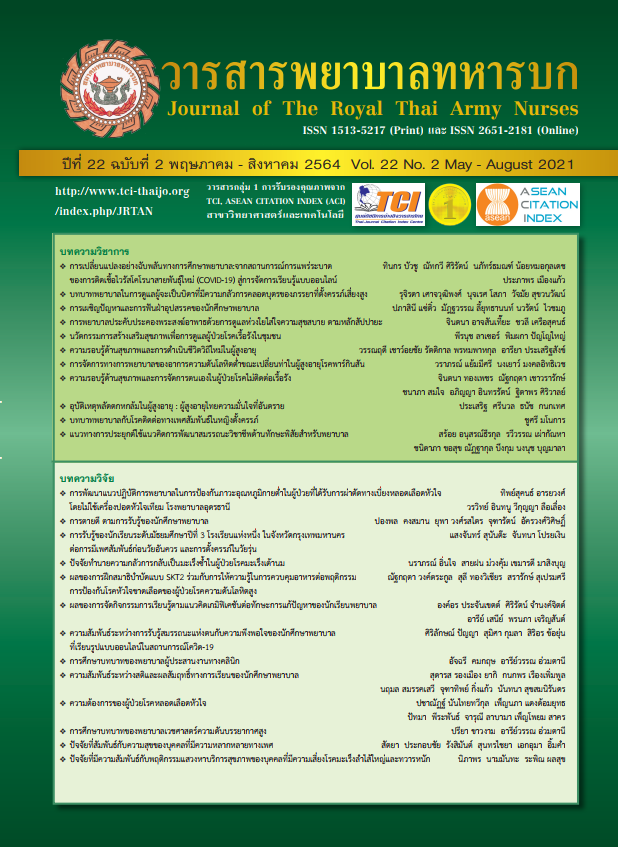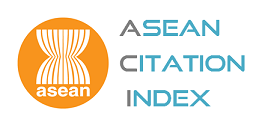Tha การพัฒนารูปแบบการช่วยเลิกบุหรี่โดยการสัมภาษณ์เพื่อเสริมสร้างแรงจูงใจสำหรับนักศึกษาระดับอุดมศึกษา
คำสำคัญ:
การพัฒนารูปแบบการช่วยเลิกบุหรี่, การสัมภาษณ์เพื่อเสริมสร้างแรงจูงใจ, นักศึกษาระดับอุดมศึกษาบทคัดย่อ
การวิจัยและพัฒนานี้ มีวัตถุประสงค์เพื่อพัฒนาและศึกษาประสิทธิผลของรูปแบบการช่วยเลิกบุหรี่โดยการสัมภาษณ์ เพื่อเสริมสร้างแรงจูงใจสำหรับนักศึกษาระดับอุดมศึกษา แบ่งการศึกษาเป็น 3 ระยะคือ 1) วิเคราะห์สถานการณ์การช่วยเลิกบุหรี่ ในสถาบันอุดมศึกษา 2) การดำเนินงาน 3) การประเมินผล คัดเลือกกลุ่มตัวอย่างแบบเฉพาะเจาะจง แบ่งเป็น 2 กลุ่มตามระยะ พัฒนารูปแบบ ดังนี้ ระยะวิเคราะห์สถานการณ์ กลุ่มตัวอย่าง คือ บุคลากรผู้เกี่ยวข้องกับงานมหาวิทยาลัยปลอดบุหรี่ นักศึกษา พยาบาล และนักศึกษาที่มีพฤติกรรมสูบบุหรี่ จำนวน 20 คน ระยะการดำเนินงานมีการทดลองใช้รูปแบบการช่วยเลิกบุหรี่ กลุ่มตัวอย่างเป็นนักศึกษาพยาบาล จำนวน 27 คน และนักศึกษาที่มีพฤติกรรมสูบบุหรี่ จำนวน 27 คน เก็บข้อมูลระหว่าง 1 มิ.ย. 2561 ถึง 30 มิ.ย. 2562 ด้วยแบบสัมภาษณ์การสนทนากลุ่ม แบบวัดความรู้และทักษะการช่วยเลิกบุหรี่โดยการเสริมสร้างแรงจูงใจ และแบบสอบถามความตั้งใจในการเลิกสูบบุหรี่ วิเคราะห์ข้อมูลการสนทนากลุ่มด้วยวิธี Content analysis วิเคราะห์การใช้รูปแบบ การช่วยเลิกบุหรี่ด้วยสถิติ Pair t-test
ผลการวิจัย พบว่า หลังใช้รูปแบบการช่วยเลิกบุหรี่โดยการสัมภาษณ์เพื่อเสริมสร้างแรงจูงใจ นักศึกษาพยาบาล มีคะแนนความรู้ ทักษะการช่วยเลิกบุหรี่สูงขึ้น (Mean diff. = 9.55, 25.59 ตามลำดับ, p-value<0.01) สำหรับนักศึกษาที่มี พฤติกรรมสูบบุหรี่มีคะแนนเฉลี่ยความตั้งใจในการเลิกสูบสูงขึ้น (Mean diff. = 2.00, p-value<0.01) รูปแบบนี้จึงนำไปใช้กับ สถาบันอุดมศึกษาอื่นเพื่อพัฒนาศักยภาพนักศึกษาด้านการช่วยเลิกบุหรี่ และลดจำนวนผู้สูบบุหรี่ในกลุ่มเยาวชน
Downloads
เอกสารอ้างอิง
National Statistical Office. The survey of Thai smoking and drinking behaviors in 2014. 2nd. Bangkok: Chareandeemunkong printing; 2014. (in Thai)
Kongsakon R. Protect youth from tobacco strategies marketing. Journal of Tobacco control research and Knowledge management 2020; 3:4-7.
Department of Disease Control. Thai mortality statistic. Nonthaburi: Department of Disease Control; 2015. (in Thai)
Rollnick S, Miller WR. Motivational interviewing helping people change. 3rd ed. New York: Guilford Publications; 2012.
Pantaewan P, and Prasittivatechakod A. Application of Transtheoretical Model and Smoking Behavior Modification. Journal of The Royal Thai Army Nurses 2014; 15(1):36-44. (in Thai).
Yaghoub MB, Elhomani A, and Catley D. Effectiveness of motivational interviewing, health education and brief advice in a population of smokers who are not ready to quit. BMC Medical Research Methodology 2018; 53:1-10.
Catley D, Goggin K, Harris KJ, Richter KP, Williams K, Patten C, et all. A Randomized Trial of Motivational Interviewing: Cessation Induction Among Smokers with Low Desire to Quit. Am J Prev Med. 2016; 50(5):573-583.
Krigel SW, Grobe JE, Goggin K, Harris KJ, Moreno JL, and Catley D. Motivational interviewing and the decisional balance procedure for cessation induction in smokers not intending to quit. Addictive Behaviors. 2017; 64(2):171-178.
Burns N, Grove SK. The practice of nursing research. 8th ed. Philadelphia: Saunders; 2016.
Piriyakitkamjorn B, and Chutipattana N. Approaches to Smoking Prevention and Smoking Cessation among Youth in Songkhla Province. The Southern College Network Journal of Nursing and Public Health 2018; 5(1):108-123. (in Thai)
Choojai R, Wongsawang N, and Kitnopkiat K. Coaching in Learning Process by Reflection Method: The Case of Three Baskets Technique. Journal of Nursing and Education 2020; 13(2):1-9. (in Thai).
ดาวน์โหลด
เผยแพร่แล้ว
รูปแบบการอ้างอิง
ฉบับ
ประเภทบทความ
สัญญาอนุญาต
บทความหรือข้อคิดเห็นใดใดที่ปรากฏในวารสารพยาบาลทหารบกเป็นวรรณกรรมของผู้เขียน ซึ่งบรรณาธิการหรือสมาคมพยาบาลทหารบก ไม่จำเป็นต้องเห็นด้วย
บทความที่ได้รับการตีพิมพ์เป็นลิขสิทธิ์ของวารสารพยาบาลทหารบก
The ideas and opinions expressed in the Journal of The Royal Thai Army Nurses are those of the authors and not necessarily those
of the editor or Royal Thai Army Nurses Association.







